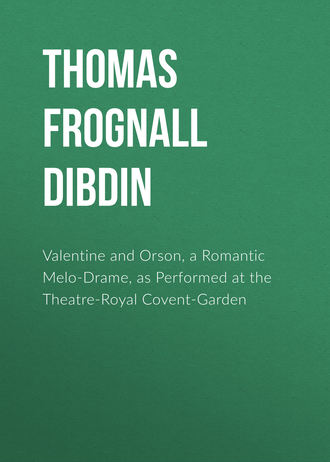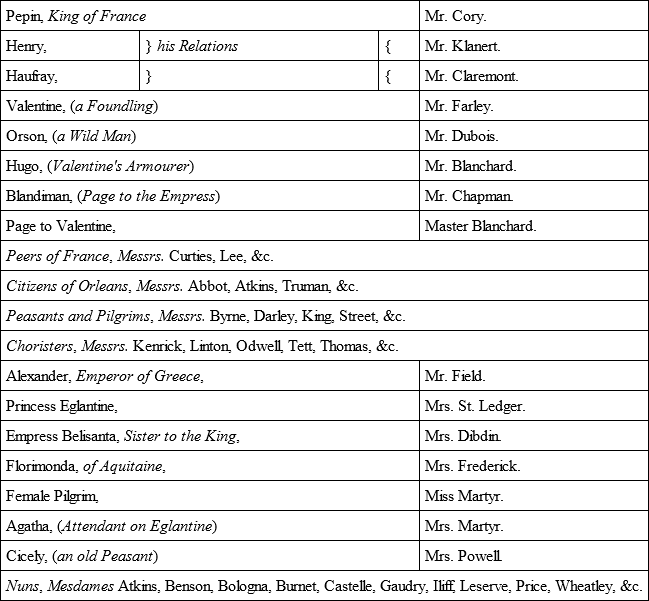 полная версия
полная версияValentine and Orson, a Romantic Melo-Drame, as Performed at the Theatre-Royal Covent-Garden

Thomas Frognall Dibdin
Valentine and Orson, a Romantic Melo-Drame, as Performed at the Theatre-Royal Covent-Garden
AS A FEEBLE, THOUGH SINCERE, ACKNOWLEDGEMENT OF HIS PROFESSIONAL EXERTIONS, UNREMITTING ZEAL, ATTENTION, AND ASSIDUITY, IN THE STAGE-ARRANGEMENT OF THE FOLLOWING BAGATELLE, ITS PAGES ARE MOST CORDIALLY INSCRIBED BY
T. DIBDIN.The Ladies and Gentlemen, who have so eminently distinguished themselves in the Performance, are also respectfully desired to accept, as they most amply merit, the Author's best Thanks.
⁂The Lines marked by inverted Commas, are omitted in Representation.
CHARACTERS
FRENCH

ACT I
SCENE I.—A long Perspective of the Suburbs of Orleans, terminating with the ancient City Gates – On one Side a Convent, the Windows of which are illuminated from within – The Stage is at first dark, which gives Effect to the Transparency of the Windows – As the Curtain rises slowly, the following choral Chaunt, accompanied by the Organ, is heard from the Interior of the Monastery
Hear, while our choral numbers flow,Hear! and avert the awful doom,Which human frailty fears below,When summon'd to the insatiate tomb.The Monastery Gates open, and the Friars and Nuns enter in Procession, singing the following
CHORUSNow bolder raise the hallow'd strain,While living worth we haste to meet,Our King, victorious comes again,Again our foes sustain defeat.They cross to the opposite Side, and exeunt while singing. – As they go off, the Stage becomes lighter (descriptive Music) The Dawn reddens, and the Sun rises over the City; the Gates of which are thrown open, Hugo, with a Mob of Citizens, Soldiers, and Peasantry, come shouting down to the Front of the Stage, the Music ceases and Hugo speaks.
HugoStop! stop! stop! now don't be in such a plaguy hurry. The holy brethren and sisters are just before us, and you, with your noise, would interrupt their merry solemnity.
First CitizenMerry solemnity, do you call it?
HugoAy, truly – they have just chaunted a solemn requiem in annual memory of the king's departed sister – and now, a merry occasion calls them forth to meet our good old king himself, who has been fighting for his people, conquered his foes, and deserves the thanks of all his friends.
Second CitizenThen why stand we here?
HugoWhy not? The king will pass through that gate, for the opening of which we have so long waited – and instead of going to the show, if we tarry a few moments, the show will come to us.
Third CitizenThey say the king's favourite, young Valentine, hath gained great honour in these wars.
HugoThat he hath: – and humble though I seem, I have helped him to no small part of it.
AllYou!
HugoTo be sure – I made the very sword with which he slew the Saracens; and I defy any man to be killed with a better tempered weapon. Oh! I'll be bound he laid about him. – He had 'em here, and he had 'em there. (Flourishing his stick to the annoyance of the mob.)
Second CitizenBut, friend Hugo, why shou'd the king lavish so much favour on a foundling?
Old WomanAye, aye, he was found in a forest – Well, well, when great men go a-hunting, and find children in the woods, it's time for the fair sex to look about 'em.
Third CitizenAnd mark the end of it – In that very spot where Valentine was found, there has suddenly appeared a strange wild man, some say he is fourteen feet high.
Second CitizenNo, no; thirteen feet and a half.
Third CitizenWho, to feed an old weather-beaten she-bear, bears down all before him.
First CitizenNay, but Valentine is well-beloved among us too: the old men admire him, and his courtesy has gained him the hearts of all the young women.
Old WomanHe never said a civil thing to me in all his life.
HugoThere it is – his honesty has made him enemies. There's Henry and Haufray, the cousins of the king, have determined to destroy him, because one is said to want to be heir to the throne, by marrying the king's daughter, the Princess Eglantine; and the other conceits himself to be the only man in the kingdom, fit for the office of captain general over all our victorious armies. Stand aside! – Here come all our noble peers to meet the king.
GRAND MARCHThe Peers of France advance from the Gate to meet the king, who enters with the following
ORDER OF PROCESSIONAn OfficerBanner of FranceMen at Arms, two and twoOfficerBannerSoldiers with Spears and ShieldsChoristers, two and twoGrand CrossLady AbbessChoristersGrand CrozierNuns and Friars, two and twoBlack MusiciansOfficer bearing the OriflammePeers of France, two and twoThe KingPages and Armour bearersHenry and HaufrayOfficerRed BannerMen at ArmsOfficerBannerSoldiersPage with Valentine's StandardValentineSaracen General and Officers in ChainsThe Chorus forms an Accompaniment to the MarchCHORUSWith the gladsome notes of victory,Let the merry cymbals ring,Till earth resounds a people's cry,Whose hearts proclaim —Long live the King!During the Chorus the Characters are so arranged that the King is in the centre, and when the Music stops, he speaks:
KingThis genuine welcome from my people is the most brilliant trophy I have gained: – but thank not me, my friends – to this young warrior's arm we owe success. (pointing to Valentine) The giant chieftain of yon pagan host measures his length on earth, subdued by valour and by Valentine.
ValentineMy gracious liege; the child of chance, the creature of your bounty can never atchieve a thousandth part of what he owes to you, his sovereign, and his father.
KingYet, in requital of that sense of honour, take from thy king the Earldom of Auvergne.
Henry(Apart to the King.) Auvergne! a royal title! – He'll next obtain the crown – Sure, my liege, a man unknown —
KingIt is my best prerogative to rescue unknown merit from obscurity.
Haufray(Aside.) If this goes on, he will aspire to gain the princess. (apart to the king) Men of birth, great sir —
KingWill be most proud of him, whose zeal, at once, supports my crown, their honours, and the people's cause.
OfficerDread sir, your daughter, beauteous Eglantine, impatient waits you at the royal palace.
KingTell her, we long to clasp her to a father's bosom. Captives, your lives were spared on the condition that you receive our faith (the Saracens bow). Be preparation made, and let Religion's triumph grace our feast. Auvergne, my daughter's lips, again, shall speak her father's thanks – Our citizens of Orleans ope' their gates with loyal welcome to receive their sovereign. Thus ever may the king and people of this happy land, endeared by firm affection to each other, own the dear ties of father and of children! and, woe to those, who, with a traitor's hand, would tear the bond asunder! – Lead on.
Exeunt in procession. The King and Attendants go off thro' the city gates – The Captives, accompanied by the Friars and Nuns, enter the Monastery.
SCENE II. —Interior of the Convent
Enter Blandiman and BelisantaBelisantaHave all retired? Are we observed, my friend?
BlandimanThe fathers seek their cells to offer prayers for the new converts.
BelisantaAlas! 'tis now the twentieth year since I have sought the mournful consolation of recounting how much a wretched woman owes thy friendship.
BlandimanAway with sorrow, and in this moment of rejoicing, demand an audience of the king, your brother.
BelisantaHe thinks his sister guilty. Was I not banished by my husband the Emperor of Greece, fatally wrought on by traiterous slander, when, you, alone, accompanied a weak, defenceless woman?
BlandimanNever shall I forget when, wearied with anguish and fatigue, you sat beneath a blasted oak; the wind with mournful sound scattered the falling leaves – meanwhile your groans were echoed by the distant murmur of nightly prowling wolves.
BelisantaWhen, at my request you left me, in the hope of finding human aid, two babes, the offspring of my unkind husband, first saw the light. Starting with agony, these eyes beheld one of my children in the savage gripe of a most hideous bear. One desperate effort, short as furious, impelled me to attempt pursuit. I fell, and knew no more of sense, till from a peasant's wife I learned that she had found and borne me to her humble dwelling.
BlandimanI wandered far, till the sound of horns led me to where I met the king, who with a frown at hearing of your name, on pain of death, warned me to leave his presence.
BelisantaVainly I sought my infant left behind – reason a second time forsook her seat. – The sisters of this convent poured balm into my bosom, and religion, cloathed in the garb of patience, brought me peace.
BlandimanHave you ne'er yet disclosed your name and rank?
BelisantaAccounted dead, and masses for my soul's health yearly ordered, I vowed that as my children were for ever lost to me, my husband and my brother unconvinced of the cruel treacheries employed against me, ne'er to be known but as a sister of this order.
BlandimanYet may you hope that providence will watch o'er piety and innocence, and but to-day, I learned that Valentine, a favourite of the king's was found —
Enter a FriarFriarThe duties of our order require your presence to join the Pagan captives in preparation for the sacred change they are about to make.
BelisantaWe attend you, father. – (To Blandiman) The ceremony past, I wait your leisure – and for your friendly deeds, they'll meet reward from where I hope my prayers have long since registered them.
[Exeunt.SCENE III.—The Palace
(Descriptive Music.)The King discovered on his Throne, attended by Valentine, Henry, Haufray, and the Peers of France – the Princess is announced by her Ladies, and enters – the King presents Valentine to her as the Preserver of his Life, she receives him with a warmth of Gratitude approaching to Love – the King leads her to a Seat, resumes his Throne, and speaks:
KingBe it proclaimed that any of my subjects who have petitions to our throne, may now approach. The best acknowledgement we offer heaven for good received, is when we use the ample power it gives to bless our people. – The greatest monarch he, whose subjects are the happiest. – Let all enter.
The Music plays a characteristic Symphony – a Group of Peasantry enter, the Principal of whom unfolds a Petition, and while he and the rest kneel, recites the following
CHAUNTWith lowly respect, zeal, devotion, and duty,To your Majesty's state, and our Princess's beauty,We entreat that you'll graciously grant us assistanceAgainst a wild man, who in spite of resistance,Whoe'er in his road he may meet with, destroys,And your peaceable subjects and liegemen annoys,Then let your brave knights take this wild-man away,And your humble petitioners shall ever pray. Chorus– Then let, &c.KingWhat armed force will undertake this enterprize? When a savage strikes at the general safety, 'tis the duty of all good citizens to join against him.
HenryHaply, young Valentine, in gratitude for the high favours he receives, would gladly go alone on such an errand.
HaufrayAy, good my liege, his all-subduing valour must succeed.
ValentineFor once, whate'er your motives you're my friends. It had been arrogance, had I, before so many gallant knights, proposed myself; but now I swear, living or dead, to bring this fell destroyer to your presence, or in the forest he inhabits, leave this form a worthless token of his victory.
(Pantomime Music.)Valentine takes a respectful Leave of the King, and an affectionate one of Eglantine, who seems to reproach Henry and Haufray with causing his departure —Valentine goes off with the Peasants; the King, &c. on the opposite Side – The Scene closes.
SCENE IV.—An Apartment in the Palace
Enter Hugo, furbishing Valentine's ShieldThere – I have made Lord Valentine's shield so bright, that if the wild man does but see his face in it, he may haply take fright at his own ugly features. It's monstrous unlucky that though I have been armour-bearer and armour-maker to the young knight from the time of his first campaign, yet something has always happened to prevent my going with him, and now when so handsome an opportunity offers, I'm sadly afraid I shan't be able to find an excuse for staying behind. I've been ill of every thing I could think of, in turn, and have obtained more certificates of bad health, than would have paid for the cure of real sickness. – Let's see – what can I think of next?
Enter AgathaAgathaSo, Mr. Hugo, your poor master is going again, I fear?
HugoYes, I fear we are both going. But you see how it is with us – a willing horse, you know —
AgathaThe poor princess will cry her eyes out, she's so sorry —
HugoAnd so am I.
AgathaYou sorry! – for what?
HugoWhy, to think that – that —
AgathaOh, I know what you are sorry for – you've heard that Valentine has sworn to go alone, and that you will lose the honour of sharing in so hopeful an enterprize.
HugoHas he? how lucky! (aside) Yes, I'm monstrous sorry – I didn't know it sooner. (apart)
AgathaI knew you'd feel hurt.
HugoTrue – to think I that carried him in arms, when a boy, should see him go alone at these years.
AgathaWell, but if you were to ask him. —
HugoWhat, to break his vow? I wou'dn't have such a sin at my door, for the honour of fighting the wildest man in Christendom.
Enter Valentine, with a LetterValentineAgatha, present this to the princess, and tell her till Valentine can prove that gentle blood flows in his veins, her roseate cheek shall ne'er have cause to blush for him she has so honoured.
Agatha. (gives Valentine a Scarf.)Sir, she sends this parting token, and will pray incessantly for your return.
[Exit.ValentineThen success is certain! Come, see my armour.
Hugo(While arming him.) I humbly hope, my lord, that, now, I have no hinderance you'll graciously permit my services. I have kill'd divers wild things in my time, and might be useful.
ValentineWell, then, thou shalt go with me.
Hugo(Dropping the armour.) Shall I! O dear!
ValentineHow now?
Hugo'Twas but a sudden qualm – That was a real pain i' the back.
[Aside.ValentineI mean to take thee but to the entrance of the forest.
HugoI cou'dn't think of intruding further.
ValentineThere secure my horse, and wait my return. (Draws his sword.) Now gentle fortune aid thy knight.
And let the Fates for good or ill combine,The star that leads me on, is, Eglantine.[Exeunt on opposite sides.SCENE V.—The Forest of Orleans. (Richards.)
On one side a large Tree which can be climbed, at the back, a Cavern nearly covered with Underwood.
The Peasants enter who presented the Petition at CourtFirst PeasantWell, the king hath heard our petition, and here we go joyfully on our way home.
Second PeasantTroth, I am weary; – let us rest awhile; for when the wild man is once killed, this forest will be quite safe, and things will run in the right road again.
Third PeasantFor my part I fear nothing but the wild man – Lack-a-day! it would do you good only, an't were to hear him roar —
(Music heard without.)Mercy on us? What was that?
First PeasantThat was no honest roaring. Such sweet sounds mean no good. I have rested enough now.
[Going.Second PeasantDon't hurry so, goodman Ambrose, the music is not so bad.
Third PeasantNo matter – I wou'dn't dance with old nick for a partner, to the prettiest tune that ever was composed.
[Exeunt. Enter Three Pilgrims, who join in the followingGLEE(Accompanied by one of them on the lute.)"Pilgrims. The sun to ocean hies away."The curfeu bell is ringing,"And pilgrims thro' the twilight grey,"Now cheer the way by singing."While each, tho' weary, feels delight,"In thinking of his inn at night,"And ev'ry footstep moves in time,"As plays the distant village chime."Re-enter the Peasants runningPeasants. Mercy on us!Pilgrims. Strangers, say —Peasants. Here he comes,Pilgrims. Which is our way?Peasants. Have you seen him?Pilgrims. Whom?Peasants. He's coming.Hark! the wild man —Pilgrims. Tell us, pray.Peasants. Here you must not stand humdrumming.Yes, 'tis he – away! away!All. Away! away




